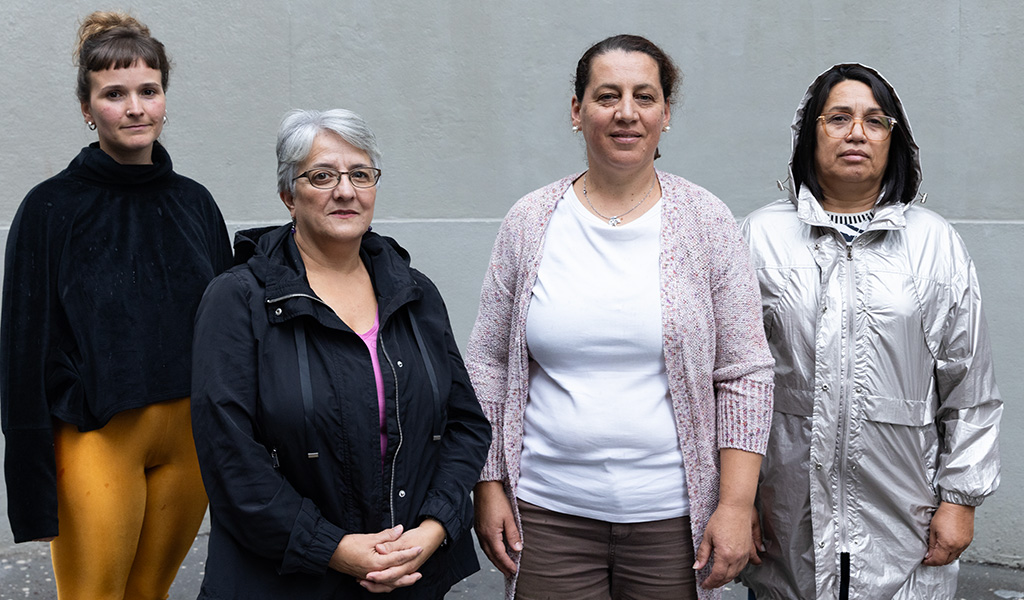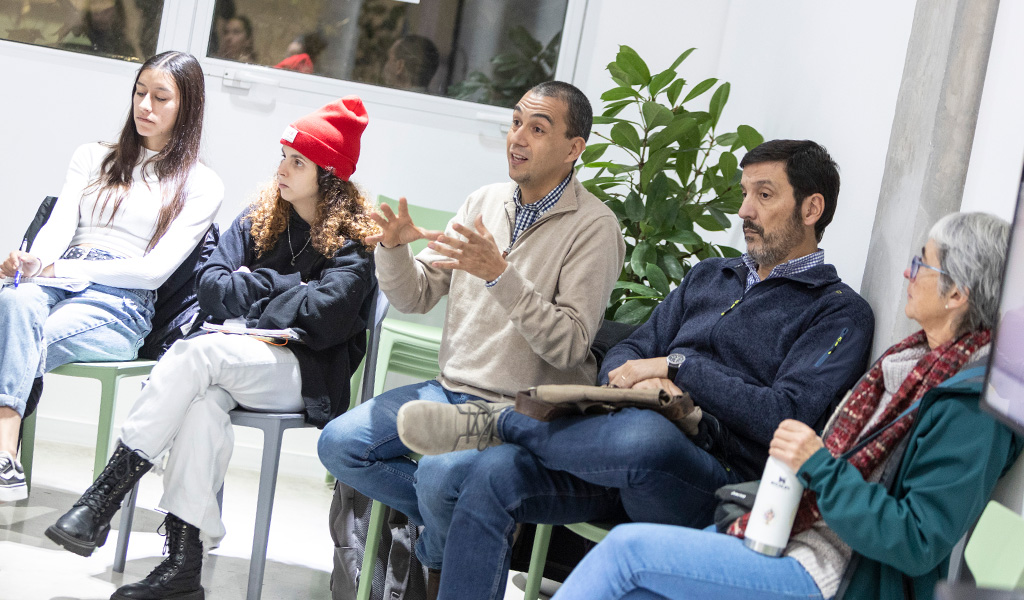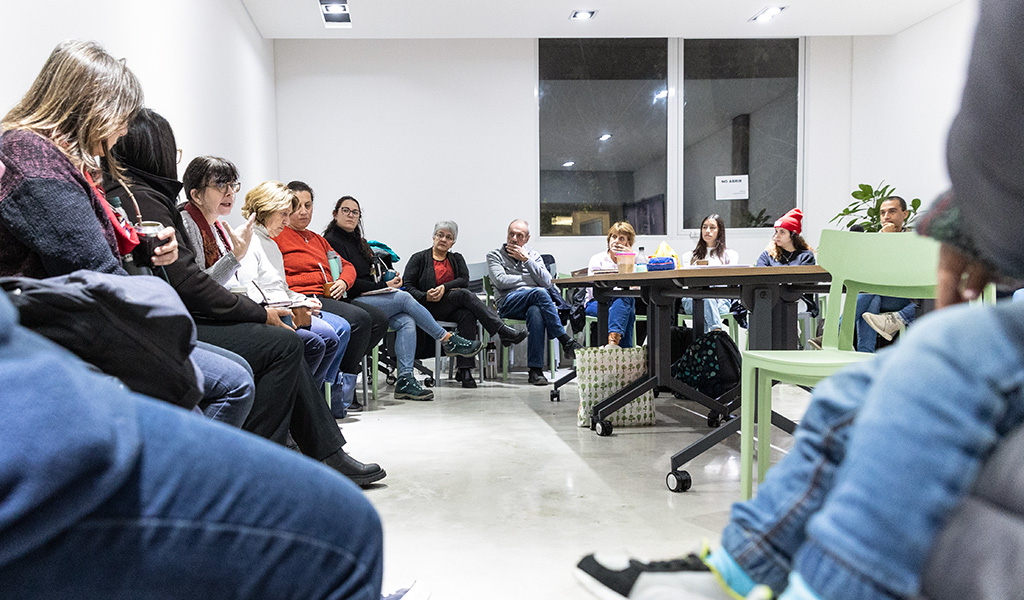By Natalia Uval y Marina Santin
It is Monday and at Espacio Colabora, in downtown Montevideo, a group of women and representatives of social organizations meet to discuss the impact of having family members in prison on children. Familias Presentes holds these monthly sessions. There are the women who have led the organization’s formation and those who come for the first time. One of them, dressed in work clothes -it is six o’clock in the afternoon- and accompanied by a little girl, says that she has her son imprisoned in Libertad Prison. The emotion prevents her from continuing to speak.

It is not known precisely how many children have parents deprived of their freedom in Uruguay, the country with the highest number of prisoners per capita in South America and the tenth in the world. There are probably 30,000, someone in the plenary estimates. The state does not have this data; therefore, there are no specific policies for this population, which is hostage to a situation that impacts their lives and development. “The prison system does not recognize the environment affected by the situation,” they warn. Sometimes, the children are ashamed to say that they visit their parents in prison, and so they lie: “I’m going to see my dad at work,” they say, for example. Adults do it, too.
“Not the whole family reacts the same way. For one part of the family, it is as if the issue did not exist,” Carmen [not her real name], one of the women who came to the collective, told the newspaper. Her son is deprived of liberty, and although she visits him regularly, she points out that her two older children “went six months without going to see their brother, without asking how he was.” “The only one who asked me was my grandson, poor thing, who expected to find me alone and said: ‘Grandma, he’s not in a cage, is he?”.
Lucía [not her real name], another of the family members consulted, talks about the challenge of “being able to speak and say that I have a family member deprived of liberty” and, at the same time, how important it is to “make it visible because it can happen to anyone, and we have to break the stigma”. “I am happy that my colleagues ask me every Sunday, ‘How did you find him? How was he? What is he doing?’. That comforts you because you feel that he hasn’t been buried, that he is not dead,” adds Carmen.
Marisa is part of the collective Memoria en Libertad, made up of children and adolescents who suffered the actions of State terrorism in the last century. That day, in the plenary, she said that today, the rights of children continue to be violated, that they have to miss school to attend visits, that they have no psychological preparation, and that they suffer social stigmatization.
In Familias Presentes, there is a group that is working specifically on the impact of prison on children and teenagers who have family members deprived of liberty. “We are concerned about the children and prison, both those who go and those who do not go, because, in reality, there are many families who make the decision for the children not to go, or the children, when a certain moment arrives, make the option of not visiting,” explained Gabriela Rodríguez, one of the founders of the association, in an interview with the newspaper. For example, she pointed out that they will present a project to the National Rehabilitation Institute to “alleviate the waiting time with some recreational or artistic activity.”
Invisible families
The plenary recalled the existence of the Bogotá Principles, which establish rights for the families of persons deprived of their liberty. It stated that it is necessary to eliminate the view that the only ones affected by the deprivation of freedom are those in prison. According to figures from 2023, Uruguay reached the highest rate of imprisonment in its history: about 400 prisoners per 100,000 inhabitants (around 15,000 prisoners in the whole country). “This means that if there are between four and five family members affected by each prisoner—as the collective estimates—there are some 70,000 Uruguayans directly affected by prison.”
But Familias Presentes was not born out of the relatives’ concern for their situation but to work for the rights of those deprived of their liberty. With time, as they began to talk to each other and learn more about their experiences, they realized that their rights “are also infringed,” recalls Rodríguez. “Because at first, you say, ‘I don’t care, I dress however I want, but then the years go by, and you realize how that affects you, and you denaturalize it,’” he explains.
La diaria interviewed Rodríguez, Daniela Durán, Carolina Doglio, and Martha Billares, members of the organization. When asked if, at any time, from the moment a person is sent to prison, the relatives are informed about their rights during their transit through the penitentiary system, the interviewees agreed no. “For the relatives, there is nothing, and that is part of what we are learning,” said Durán. For this reason, Familias Presentes works, among other things, on access to information for the relatives of prisoners.
“We understand that the system focuses on the person in prison and takes an individual approach. The family, or the environment where the penitentiary system also has an impact—because we also go through it—is left aside,” said Doglio. This lack of knowledge, according to Familias Presentes, often translates into abuses or institutional violence: “The institution treats you as if you were also a criminal,” said Durán.
According to the group, the paradox is that the families are in charge of covering the gaps left by the State in its responsibility towards prisoners by “accompanying, thinking about the release and supporting the person economically and emotionally,” explained Doglio. The task of covering the basic needs of the prison population falls, mainly, on women, because those who make the queues are generally women, they say, something that is reflected in the integration of the association, which is mostly female. “This aggravates the situation of women who are deprived of their freedom because, suddenly, they have their mother, but the mother has to take care of the children,” said Durán.

However, having a family member in prison does not only affect the economy of the person who brings the food package or the cleaning products: you also need to make time to visit, which implies having free time or work flexibility to adapt to the schedules of the visits, and the proper preparation to go, because you do not go in just any condition. “You have to have, as we all say, the ‘uniform’,” Martha explained. “In general—because each establishment has its own rules—the prohibited colors are black, blue, green, camouflage print, white, dark gray, and beige. ‘It has to be long pants, it can’t be shorts, it can’t be a skirt, it can’t be torn pants or platforms,’ added Daniela.”
“In the [former] Comcar (one of the prisons with the worst conditions in Uruguay) you can’t wear a hood or a cap in winter or a sun hat in summer. The Ministry of Health recommendations for prisoners’ families do not apply,” said Gabriela. Doglio added that the rules of dress are affected by gender violence: “You have to think about what you are going to wear and you also have to stop being you, because if I wear these shoes,” she said, “I might provoke someone. And in response to the need, the market responds: “In all prisons, there are people who rent clothes so that you can get in”.
After entering, there is the check-up, and where there is no scanner – or the officials understand that there is not enough – you have to go to “the piece,” Doglio said, referring to a room where the visitor must undress and undergo a more exhaustive check-up. “You have to take off your shoes, take off your clothes, show your orifices, bend over, cough,” he explained. Disposable items, such as baby and adult diapers or feminine pads, are discarded: “You have to bring a spare diaper because that goes to the garbage and it is at the family’s expense,” remarked Rodríguez.
However, Doglio pointed out that the biggest frustration is that of the families who want to but cannot materially accompany their relatives deprived of freedom: “The prisons are full of gurises (young people) who are mostly young and poor, and that also has a lot to do, because sometimes the families want to accompany, but sometimes they cannot, maybe they do not have resources, they do not have tools, they do not have enough to send a package every week and to send the basic things”, he said.
Things are not easy on an emotional level either. “There is no one to explain to you, to tell you what’s going to happen, in other words, you are finding out the hard way,” said Doglio, and described that feeling as the “anguish of not knowing where the person you love is, that, if you are lucky, you communicated once or you were able to give him something, and the uncertainty. Uncertainty generates anguish and pain.
“Here come the madrecitas”
Familias Presentes began to take shape in August 2022. Rodríguez pointed out that the “push” for its creation was given by Graciela Barrera, today’s senator for the leftist coalition Frente Amplio but at the time president of the Association of Relatives of Victims of Crime. “That impulse came from having lived as a victim. From that place, she always understood very well, with a lot of human greatness, that there are not two sides, that people are all within society and, for different circumstances, we have different circumstantial roles”, reflected Rodríguez, who also mentioned as “another great promoter” the former director of the National Directorate of the Released Jaime Saavedra.
Rodríguez said that what mobilized the founders was that “from the first time we stood in line and from the first time we had to say ‘where are we going to find out about this’” they noticed that “one leg” was missing, which was “the organized families, because nobody else but us is going to be interested in the families being treated with dignity, having the information they should have and avoiding abuses”. He also considered that the idea “came at a time when we, as families, were also in a position to transcend the individual situation to be able to work for the collective.”

Rodríguez believes the prison situation, marked by overcrowding, violence, and precariousness, is more visible now than “until two, three or four years ago,” which favors the recognition that Familias Presentes has had in the years it has been working. “Today it is a more daily concern, and we do not say that it is the work of Familias Presentes, but we are also recognized for something, and our voice is sought to know what we think, what we feel; evidently because it was a voice that did not exist, that was not visible,” she pointed out.
Although he confessed that “it is difficult,” Rodríguez hopes that “as a society, we will one day understand” that the way forward is not “to spend on prisons, but that if we do things differently, we will be investing” in rehabilitation, and that more alternative measures to prison should accompany this. “Our society for many years has asked for more prisons, more and longer sentences as a solution to security, and the political system, in part, has responded, unfortunately, with an atrocious punitive inflation that today I think no one can argue that it has been the solution to anything,” she stressed.
Rodríguez highlighted that Familias Presentes will have a place in the inter-institutional and inter-party round table called by the National Human Rights Institution and the Parliamentary Commissioner of the Penitentiary “for the transformation of the prison system” and understands that this is “the confirmation that what we have been doing and how we have been working generates the necessary respect.”
Billares said that in the context of the election year, the organization is planning to “approach all the political parties and, surely, to carry out some activity in which they will have to publicly state their position on certain issues” related to the prison system. Likewise, Familias Presentes is working on a resource guide for relatives of persons deprived of their freedom, with the purpose of “advising people, where they can go, how they have to get there, with their clothes, when they need a transfer, where they have to go” and other frequent doubts.
On the other side
Rodríguez pointed out that “for those in prison,” it is important “to know that there are people on the outside who care” about what happens on the other side of the bars. “We experienced it with Martha: we arrived at the Canelones prison and, when we started to pass [the cells, they heard], ‘hey, hey, watch out, here come the little mothers,’” exemplified Durán. The other members agreed that they were grateful to the prisoners. “They are always grateful that someone cares about them,” said Durán.
In a conversation with la diaria, a prisoner who is serving a sentence in Unit 4 of Santiago Vázquez said that he met Familias Presentes two weeks after his arrival: “I explained my situation to them, they listened to me and came to see me, they brought me things I needed, hygiene, food, and they made themselves available to me. hey explained to me what [the organization] was all about; they were like family support,” he said. He said that they helped him to get “a school place,” something he describes as “very difficult in the prison system,” because “it is very slow and blocked.”
“Medical assistance is also very difficult; apparently, if you don’t have something serious, it’s not an emergency, and they helped me with that too. They always supported me and asked me how I did and felt. They have given me the support of a united family and have done so with many in this facility,” he said. “At least I don’t feel like I’m alone anymore.”
This story was originally published in la diaria (Uruguay) and is republished within the Human Journalism Network program, supported by the ICFJ, International Center for Journalists.
